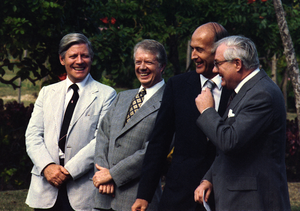
The Guadeloupe Conference was a meeting in Guadeloupe from 4 to 7 January 1979 involving leaders of four Western powers: the United States, the United Kingdom, France and West Germany. Discussions focused on various world issues, especially the Middle East and the Iranian political crisis.
Meeting
| Part of a series on the |
|---|
| History of the Iranian revolution |
 |
| Topics |
Revolutionary leaders
|
| Parties and organizations |
| Official institutions |
| Events |
| See also |
A month before the Iranian Revolution succeeded in the overthrow of the monarchy, the President of France, Valéry Giscard d'Estaing, hosted the meeting in the French territory of Guadeloupe. Also in attendance were US President Jimmy Carter, Chancellor of West Germany Helmut Schmidt, and British Prime Minister James Callaghan.
Discussion
The meeting's discussions focused on Iran's political crisis, the situation in Cambodia, violence in South Africa, the increasing influence of the Soviet Union in the Persian Gulf, the coup in Afghanistan, and the situation in Turkey. One of the main issues discussed was the political crisis in Iran which had led to an uprising against the Pahlavi dynasty. The assembled leaders concluded that there was no way to save Mohammad Reza Pahlavi's position as the Shah of Iran; and that if he remained as leader, this could further aggravate the civil war and might result in Soviet intervention.
Impact
The leaders at the Guadeloupe Conference suggested that Shah leave Iran as early as possible. Following the meeting, domestic protests and opposition to the Pahlavi dynasty increased. After the conference ended, the Shah's regime collapsed and he left Iran for exile on 16 January 1979 as the last monarch of the Pahlavi dynasty.
Downfall of Callaghan government
The summit also led, indirectly, to Callaghan's election loss to Margaret Thatcher almost four months later. His participation in the summit had been preceded by a few days' holiday during which he was photographed swimming joyfully and wearing swimming trunks on the beach. During that same week Britain had been struggling with the economic impact of a severe winter storm and a lorry drivers' strike, the second of many industrial disputes which led to that season being remembered as the Winter of Discontent.
Upon Callaghan's return on 10 January, a political advisor, Tom McNally, convinced him to hold a brief news conference with waiting reporters after he deplaned at Heathrow Airport, against the advice of the prime minister's press secretary. McNally believed that Callaghan could reassure the public that he was in control by doing so. The impromptu news conference instead hurt Callaghan politically.
Callaghan at first focused on his own trip, jauntily pointing out how pleasant it had been to swim in the tropical waters off Guadeloupe. He suggested that Britain's domestic situation only looked as bad as it did because the media had exaggerated it, and cast aspersions on reporters' patriotism. Asked directly what he would do about "mounting chaos" in the UK, he responded: "f you look at it from outside, and perhaps you're taking rather a parochial view at the moment, I don't think that other people in the world would share the view that there is mounting chaos."
The Sun, a newspaper which had recently switched its political allegiance from Callaghan's Labour to the opposition Conservatives, paraphrased this in a headline as "Crisis? What Crisis?". The Conservatives made much use of the phrase during the upcoming election, and in subsequent campaigns.
References
- ^ William Shawcross (15 October 1989). The Shah's Last Ride. Simon and Schuster. p. 133. ISBN 978-0-671-68745-8.
- Robert D. Putnam, Nicholas Bayne (1984). Hanging Together: The Seven-power Summits. Harvard University Press. pp. 109. ISBN 9780674372252.
guadeloupe summit meeting 1979.
- Babak Ganji (28 April 2006). Politics of Confrontation: The Foreign Policy of the USA and Revolutionary Iran. I.B.Tauris. p. 8. ISBN 978-0-85771-575-3.
- "House of Commons Statement, Guadeloupe Summit". Margaret Thatcher Foundation. Archived from the original on 2019-10-10. Retrieved 2016-01-24.
- Hosseini, Mir M. "Guadeloupe Conference On Iran". The Iranian History Article. www.fouman.com/. Archived from the original on 2019-02-02. Retrieved 2016-01-24.
- "Readout of the Guadalupe Conference". Islamic Revolution document center. Archived from the original on 2016-05-30.
- "Unspoken Events of the 1979 Revolution". Archived from the original on 2019-06-14. Retrieved 2016-01-24.
- Manouchehr Ganji (2002). Defying the Iranian Revolution: From a Minister to the Shah to a Leader of Resistance. Greenwood Publishing Group. p. 35. ISBN 978-0-275-97187-8.
- Mard, Muhammad Rad (3 January 1979). "From the Guadalupe Conference to Royal Cries". Islamic Revolution Document Center. Archived from the original on 14 November 2015. Retrieved 26 January 2016.
- Ronen A. Cohen (18 March 2015). Identities in Crisis in Iran: Politics, Culture, and Religion. Lexington Books. p. 113. ISBN 978-1-4985-0642-7.
- ^ López, Tara Martin (2014). The Winter of Discontent: Myth, Memory and History. Oxford University Press. pp. 97–98. ISBN 9781781386019.
| Guadeloupe articles | |||
|---|---|---|---|
| History | |||
| Geography | |||
| Politics |
| ||
| Economy | |||
| Culture | |||
| Diplomatic posts |
|
|---|---|
| Diplomacy |
|
| Conflicts | |
| Incidents after 1979 |
|
| Legislation |
|
| Groups and individuals |
|
| Related |
|
- Diplomatic conferences
- 1979 conferences
- 1979 in international relations
- 1970s in Guadeloupe
- January 1979 events in North America
- History of Guadeloupe
- Iranian revolution
- Pahlavi Iran
- Presidency of Jimmy Carter
- James Callaghan
- France–Iran relations
- France–West Germany relations
- France–United Kingdom relations
- France–United States relations
- Iran–United Kingdom relations
- Iran–United States relations
- Germany–Iran relations
- United Kingdom–West Germany relations
- United Kingdom–United States relations
- United States–West Germany relations

